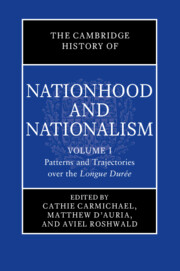Book contents
- The Cambridge History of Nationhood and Nationalism
- The Cambridge History of Nationhood and Nationalism
- The Cambridge History of Nationhood and Nationalism
- Copyright page
- Contents
- Figures
- Contributors
- General Introduction
- Part i The Politics of Ethnicity, Nationhood, and Belonging in the Settings of Classical Civilizations
- 1 Nationality and Ethnicity in the Ancient Near East
- 2 Nationhood: Was There Such a Thing in Antiquity?
- 3 The Holy Roman Empire
- 4 Ancient China
- 5 Politicized Ethnicity in Precolonial Southeast Asia
- 6 “India” before the Raj: Space and Identity in South Asian History
- Conclusion to Part I
- Part ii Paradigm Shifts and Turning Points in the Era of Globalization, 1500 to the Present
- Index
- References
2 - Nationhood: Was There Such a Thing in Antiquity?
from Part i - The Politics of Ethnicity, Nationhood, and Belonging in the Settings of Classical Civilizations
Published online by Cambridge University Press: 27 October 2023
- The Cambridge History of Nationhood and Nationalism
- The Cambridge History of Nationhood and Nationalism
- The Cambridge History of Nationhood and Nationalism
- Copyright page
- Contents
- Figures
- Contributors
- General Introduction
- Part i The Politics of Ethnicity, Nationhood, and Belonging in the Settings of Classical Civilizations
- 1 Nationality and Ethnicity in the Ancient Near East
- 2 Nationhood: Was There Such a Thing in Antiquity?
- 3 The Holy Roman Empire
- 4 Ancient China
- 5 Politicized Ethnicity in Precolonial Southeast Asia
- 6 “India” before the Raj: Space and Identity in South Asian History
- Conclusion to Part I
- Part ii Paradigm Shifts and Turning Points in the Era of Globalization, 1500 to the Present
- Index
- References
Summary
Did the ancients have the concept of nationhood? To raise that question is to enter a minefield. The issue of what counts as a nation has generated a flood of articles and monographs, mostly by anthropologists and sociologists, with a smattering by historians.
The very idea of a nation or nationhood has been preeminently associated with modern history. Its relevance for antiquity is not obvious and has prompted much debate. Those who see it as an exclusively modern phenomenon tend to associate it with the creation of new polities in the late eighteenth and nineteenth century as nation-states. Others, however, and they have been growing in number, argue that the existence of a unifying consciousness of affinity, kinship, and shared history goes back to antiquity and amounts to nationhood or whatever one wishes to call it.
- Type
- Chapter
- Information
- The Cambridge History of Nationhood and Nationalism , pp. 31 - 53Publisher: Cambridge University PressPrint publication year: 2023



